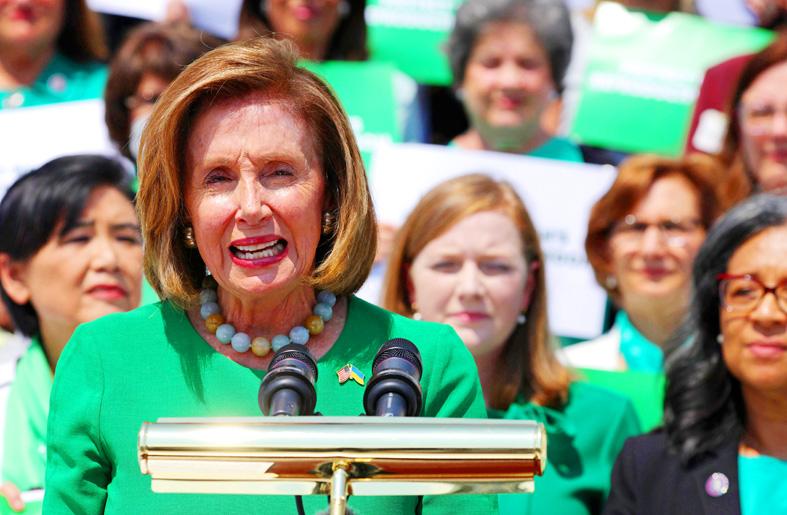Many Taiwanese have shrugged off China’s warnings of repercussions from a possible trip to Taipei by US House of Representatives Speaker Nancy Pelosi, saying they are accustomed to Beijing’s saber rattling and saw no cause for alarm.
Such a trip would be the first by a US House speaker since 1997.
While news of a possible visit has been widely reported in Taiwan, front-page stories in the past week have focused on political campaigns ahead of local elections this year, as well as record-breaking temperatures.

Photo: AFP
Waiting for a doctor’s appointment on a busy street in Taipei, Chen Yen-chen gave voice to a widely held view about China’s remarks.
“That is mostly verbal threats and intimidation, so this time around I am quite at ease,” said the 30-year-old, who works in education.
Visits by US officials to Taiwan have become a frequent source of tension between Beijing and Washington.
Despite fears that a visit could trigger a fourth crisis over the Taiwan Strait since 1949, politicians and diplomats in Taiwan have said that people are used to military intimidation by the Chinese People’s Liberation Army (PLA).
“To the Taiwanese people, Chinese threats have never stopped in the past decades. It’s happening every day,” Democratic Progressive Party Legislator Wang Ting-yu (王定宇) said. “Taiwan needs to be on guard, but Taiwan will not cave in to fear.”
A visit by Pelosi would be welcomed, said Chinese Nationalist Party (KMT) Department of International Affairs director Alexander Huang (黃介正), who is also the party’s representative in the US.
“Of course it raises Taiwan’s visibility and it shows the American commitment to Taiwan in a pretty formal way,” Huang said, describing the impact such a visit would have.
Beijing’s threats of unspecified “serious consequences” are merely the same old warnings for 26-year-old office assistant Hung Chien, who said: “I am already used to China issuing such statements, so I am not overly nervous.”
Military threats have only made Taiwan more determined to stand up to Beijing, some analysts said.
For example, during the Third Taiwan Strait crisis in 1995 and 1996, the PLA fired missiles into the waters near Taiwan ahead of its first direct presidential vote.
That move was widely interpreted as a warning against supporting a candidate Beijing saw as pushing for Taiwan’s formal independence.
Former president Lee Teng-hui (李登輝) won by a landslide.

A preclearance service to facilitate entry for people traveling to select airports in Japan would be available from Thursday next week to Feb. 25 at Taiwan Taoyuan International Airport, Taoyuan International Airport Corp (TIAC) said on Tuesday. The service was first made available to Taiwanese travelers throughout the winter vacation of 2024 and during the Lunar New Year holiday. In addition to flights to the Japanese cities of Hakodate, Asahikawa, Akita, Sendai, Niigata, Okayama, Takamatsu, Kumamoto and Kagoshima, the service would be available to travelers to Kobe and Oita. The service can be accessed by passengers of 15 flight routes operated by

Chinese spouse and influencer Guan Guan’s (關關) residency permit has been revoked for repeatedly posting pro-China videos that threaten national security, the National Immigration Agency confirmed today. Guan Guan has said many controversial statements in her videos posted to Douyin (抖音), including “the red flag will soon be painted all over Taiwan” and “Taiwan is an inseparable part of China,” and expressing hope for expedited reunification. The agency last year received multiple reports alleging that Guan Guan had advocated for armed reunification. After verifying the reports, the agency last month issued a notice requiring her to appear and explain her actions. Guan

GIVE AND TAKE: Blood demand continues to rise each year, while fewer young donors are available due to the nation’s falling birthrate, a doctor said Blood donors can redeem points earned from donations to obtain limited edition Formosan black bear travel mugs, the Kaohsiung Blood Center said yesterday, as it announced a goal of stocking 20,000 units of blood prior to the Lunar New Year. The last month of the lunar year is National Blood Donation Month, when local centers seek to stockpile blood for use during the Lunar New Year holiday. The blood demand in southern Taiwan — including Tainan and Kaohsiung, as well as Chiayi, Pingtung, Penghu and Taitung counties — is about 2,000 units per day, the center said. The donation campaign aims to boost

The Central Weather Administration (CWA) said a magnitude 4.9 earthquake that struck off the coast of eastern Taiwan yesterday was an independent event and part of a stress-adjustment process. The earthquake occurred at 4:47pm, with its epicenter at sea about 45.4km south of Yilan County Hall at a depth of 5.9km, the CWA said. The quake's intensity, which gauges the actual effects of a temblor, was highest in several townships in Yilan and neighboring Hualien County, where it measured 4 on Taiwan's seven-tier intensity scale, the CWA said. Lin Po-yu (林柏佑), a division chief at the CWA's Seismological Center, told a news conference